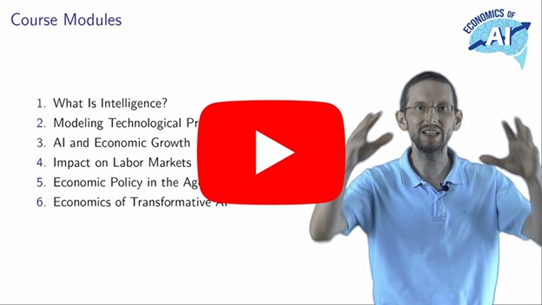After having researched the topic as part of the Centre for the Governance of AI (GovAI) for several years, I have made a six-week course on "The Economics of AI" freely available on Coursera, supported by a grant from the EA Long-Term Future Fund. The course covers how transformative artificial intelligence will affect our economy and society, labor markets, inequality, growth, and economic policy.
You can check out an intro video here:

Economics is a social science that is well-suited to modelling social processes, to examine how to intervene in them and how to make our society work better. It has long been a favorite subject to study for effective altruists. As artificial intelligence is starting to transform our world, the question of how to positively shape its economic impact has also received growing attention in the EA community. My course focuses on the long-term effects of AI on our economy and society, on economic policy solutions, and on governance structures that will be useful under transformative AI scenarios.
To sign up for the course and learn more about these topics, please go to https://www.coursera.org/learn/economics-of-ai
Course Structure
The course consists of six modules that introduce you to the cutting-edge research in the economics of transformative AI. Each module is dedicated to a specific topic that we will be covering via short videos, exercises, and readings.
The first module starts by analyzing the nature of intelligence, how it relates to our economy and how AI will transform it. This part is accessible to anyone with a social science background. The remainder of the course is targeted at people with a background in economics or a similar level of analytical skills, i.e. graduate students or advanced undergraduates. Others may enjoy the non-technical parts of the course.
The second module connects the analysis of the nature of intelligence to models of production and technological change in economics and examines how these processes are affected by AI. Then we turn to how technological change drives aggregate economic growth, covering a range of scenarios including a potential singularity in growth. We also study the impact of AI-driven technological change on labor markets and workers, evaluating whether fears about technological unemployment are well-founded and what to do about them. Next we investigate how to steer progress in artificial intelligence in a direction that benefits humanity. Finally, we analyze the potential for transformative progress in AI to lead to significant disruptions, and we use the methods of economics to study the question of how humans can control highly intelligent AI algorithms.
Please click here to sign up for the course, and please share this post with others who may be interested in the topic.
If you have any questions, suggestions or other feedback, please email me at econofai@virginia.edu.

Sounds very interesting! I'm not sure if I have the time for a course, but I'd still be happy to know - If I only have very limited time per week, what's in your opinion the minimal amount of time I'll need to put in weekly? e.g. will one hour a week make sense if I take it over half a year? Or is there a stricter limit?
I'd suggest to just try it out. Coursera allows you to reset your timeline if you go slower than the suggested schedule so it's no problem to spread out the material over a longer time range, and I hope you'll still find it informative.